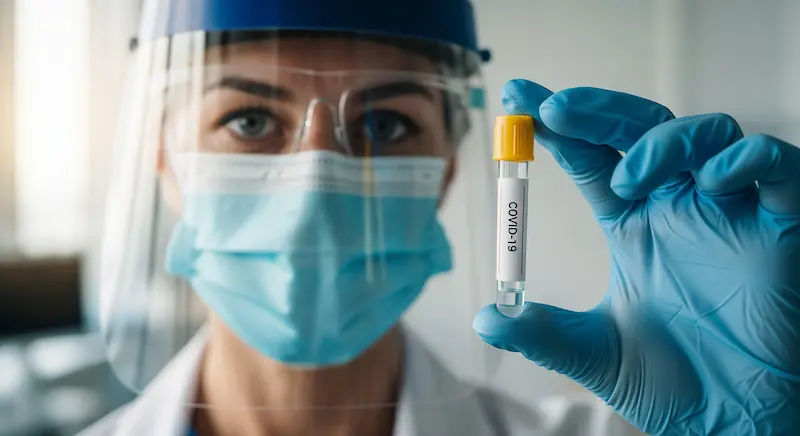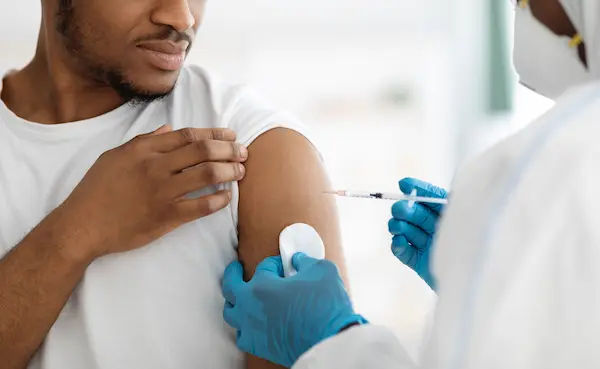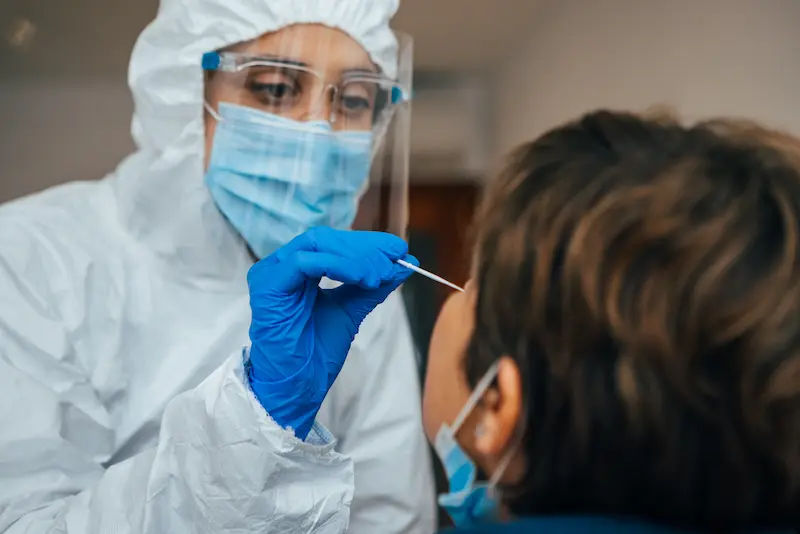Monoclonal Antibodies: A Guide to COVID-19 Treatment
Explore the science behind monoclonal antibodies, a groundbreaking treatment for high-risk COVID-19 patients. Learn how they work, why their use has changed, and their future role in medicine.

Written by Dr. Dhankecha Mayank Dineshbhai
Reviewed by Dr. Rohinipriyanka Pondugula MBBS
Last updated on 13th Jan, 2026

Imagine your body’s immune system as a highly skilled army. When a new enemy like the COVID-19 virus invades, it takes time for this army to identify the threat and develop the perfect weapon—antibodies—to fight it. For some, this process is too slow, leading to severe illness. What if we could provide the army with a ready-made, precision weapon upfront? This is the breakthrough promise of monoclonal antibodies. These laboratory-engineered proteins were once a critical tool designed to prevent severe COVID-19 illness in high-risk individuals early in their infection. This guide will demystify how this innovative treatment worked, who it was for, why its use has changed, and what its legacy means for the future of medicine. While their current use is limited, understanding them is key to grasping our pandemic response.
What Are Monoclonal Antibodies?
Monoclonal antibodies (mAbs) are not a living drug like a vaccine; they are laboratory-manufactured molecules that act as substitute antibodies. They are designed to mimic the natural antibodies your immune system produces to fight off pathogens, but they are mass-produced from a single, cloned immune cell—hence the name "monoclonal." This ensures a pure, highly targeted army of identical antibodies designed to seek out one specific enemy, in this case, the SARS-CoV-2 virus.
The Basic Idea: Mimicking Your Immune System
The concept is elegant in its simplicity. Scientists identify a person who has successfully recovered from COVID-19 and isolate the most potent antibodies from their blood. They then copy these antibodies billions of times over in a lab. The result is a concentrated dose of a specific antibody known to effectively neutralize the virus, which can then be given to a patient as a treatment.
Not a Vaccine: Understanding the Key Difference
A common point of confusion is the difference between mAbs and vaccines. A vaccine teaches your body how to make its own antibodies, providing long-term protection. Monoclonal antibody treatment, on the other hand, gives you antibodies directly. It provides immediate, but temporary, passive immunity that lasts for weeks or months. It's not a replacement for vaccination but was intended as an early intervention to stop the virus in its tracks.
How Do Monoclonal Antibodies Fight COVID-19?
The effectiveness of mAbs hinged on a very specific mechanism of action, targeting the virus's most prominent feature.
The Spike Protein: The Virus's Key
The SARS-CoV-2 virus is covered in spike proteins. These spikes act like keys, latching onto "lock" proteins (called ACE2 receptors) on the surface of our cells. Once attached, the virus can enter the cell, hijack its machinery, and begin replicating.
Neutralizing the Threat: Blocking the Lock and Key
Monoclonal antibodies are designed to bind precisely to these spike proteins. By coating the virus, they physically block the spike from fitting into the ACE2 receptor. It’s like putting a protective cover over the virus's key or putting gum in the cell's lock. This "neutralizes" the virus, preventing it from entering cells and replicating, thereby reducing the viral load in the body.
A Boost for Your Immune System
By lowering the viral load early in the infection, mAbs gave the patient's native immune system a crucial advantage. With less virus to fight, the body could mount a more effective and controlled response, preventing the uncontrolled viral replication that often leads to severe inflammation, pneumonia, and hospitalization.
The Shift: Why Aren't They Used Much Anymore?
This is the most critical part of the story. While several mAb treatments received Emergency Use Authorization (EUA) from the FDA and were used extensively, most have since had their authorizations revoked.
The Challenge of Viral Evolution
Viruses mutate over time. The SARS-CoV-2 virus has evolved through numerous variants—Alpha, Beta, Delta, and most significantly, Omicron and its subvariants. Each variant had slight changes in its genetic code, which often led to changes in the shape of the spike protein.
Specific Antibodies and Specific Variants
Because mAbs are so precisely targeted to the spike protein of a specific variant, a significant mutation can render a particular antibody therapy ineffective. The antibody may no longer be able to bind tightly to the altered spike protein. As the Omicron variant and its sub-lineages became dominant, the previously authorized monoclonal antibodies lost their neutralizing power against these new forms of the virus. Consequently, regulators like the FDA pulled their authorization because they were no longer expected to provide benefit against the circulating variants.
Consult Top Specialists
Who Was (And Could Be) Eligible for Treatment?
When they were authorized, eligibility was strict and targeted to those who would benefit most.
High-Risk Factors for Severe COVID-19
Treatment was reserved for patients with mild-to-moderate COVID-19 who were at high risk of progressing to severe disease. This included:
Older adults (typically over 65).
Individuals with obesity or overweight.
People with chronic conditions like diabetes, kidney disease, or heart disease.
Immunocompromised individuals.
Pregnant women.
The Critical Timing Window
The treatment was only effective if administered early in the course of the illness—typically within 7 to 10 days of symptom onset. Once a person develops severe COVID-19 illness requiring hospitalization and oxygen, the problem shifts from the virus itself to the body's intense inflammatory response. At this stage, mAbs are not helpful, and other treatments like steroids are used. If you suspect you have COVID-19 and are in a high-risk group, it is crucial to consult a doctor online with Apollo24|7 immediately to discuss current testing and treatment options suited to the prevailing variants.
How Were Monoclonal Antibodies Administered?
They were delivered in outpatient settings to avoid hospital visits.
Intravenous (IV) Infusion
This was the most common method, involving delivering the drug directly into a vein over a period of 30 to 60 minutes. Patients were then monitored for about an hour for any immediate reactions.
Subcutaneous Injection
Some formulations, like a combination of casirivimab and imdevimab (REGEN-COV), could be administered as four injections given at the same time. This was faster than an IV but could lead to more injection-site reactions.
Known Side Effects and Safety Profile
Overall, monoclonal antibody therapy was considered safe for most, but side effects did occur. Most were mild and included:
Injection site reactions (redness, itching, pain) for subcutaneous administration.
Allergic reactions such as rash, itching, and in rare cases, anaphylaxis.
Infusion-related reactions like fever, chills, nausea, and headache during or shortly after IV administration. The benefits for high-risk individuals generally outweighed these potential risks.
The Future of Monoclonal Antibodies
While their role in COVID-19 has diminished, the technology itself is not obsolete. The development and deployment of mAbs provided invaluable lessons for pandemic response. Researchers are continually working on developing new "broadly neutralizing" antibodies that can target parts of the virus that are less likely to mutate. Furthermore, the success of mAbs in other diseases—like cancer, autoimmune disorders, and Alzheimer's—proves their enduring value in medicine. They remain a powerful tool in our therapeutic arsenal, ready to be deployed if a new variant emerges that is susceptible to them..
Conclusion
The story of monoclonal antibodies for COVID-19 is a powerful testament to scientific innovation and agility. They emerged as a beacon of hope during the height of the pandemic, saving countless lives by preventing severe illness and reducing the burden on hospitals. While their role has faded due to the virus's relentless evolution, they were a vital weapon in our arsenal when we needed them most. Their development has accelerated the entire field of immunotherapy. Today, the focus has shifted to updated vaccines and antiviral pills, but the legacy of mAbs endures. It underscores a critical lesson: our fight against COVID-19 requires a multifaceted and adaptable approach. Stay informed about current recommendations, ensure your vaccinations are up to date, and if you test positive for COVID-19, consult a doctor online with Apollo24|7 promptly to discuss the best and most current treatment options available for you.
Consult Top Specialists
Consult Top Specialists

Dr. Md Yusuf Shareef
General Practitioner
8 Years • MBBS
Hyderabad
Apollo 24|7 Clinic, Hyderabad

Dr. Mohammed Kamran
General Practitioner
5 Years • MBBS, FIDM
Nashik
Apollo 24|7 Clinic - Maharashtra, Nashik

Dr. D Bhanu Prakash
General Practitioner
10 Years • MBBS, AFIH, Advanced certificate in critical care medicine, Fellowship in critical care medicine
Hyderabad
Apollo 24|7 Clinic, Hyderabad

Dr. Dhankecha Mayank
General Practitioner
6 Years • MBBS
Hyderabad
Apollo 24|7 Clinic - Telangana, Hyderabad

Dr. Rajib Ghose
General Physician/ Internal Medicine Specialist
25 Years • MBBS
East Midnapore
VIVEKANANDA SEBA SADAN, East Midnapore
More articles from Covid
Frequently Asked Questions
Q1: Can I still get monoclonal antibody treatment for COVID-19 today?
As of early 2024, no monoclonal antibody treatments are authorized for use in the United States due to their ineffectiveness against currently circulating Omicron subvariants. Treatment guidelines have shifted to antiviral medications like Paxlovid.
Q2: How much did monoclonal antibody therapy cost?
When authorized under the EUA, the federal government covered the cost of the drug itself. Patients may have been charged for the administration of the drug (the infusion or injection process) by the healthcare provider, but many providers waived this fee.
Q3: Are monoclonal antibodies better than vaccines?
No, they serve completely different purposes. Vaccines are a long-term preventive strategy that teaches your body to defend itself. Monoclonal antibodies are a short-term treatment used after exposure or infection. Vaccination is the best way to prevent infection and severe disease.
Q4: How long do monoclonal antibodies stay in your system?
The protective effect of a dose of mAbs is temporary, typically lasting from a few weeks to a few months. After that, the laboratory-made antibodies are naturally cleared from the body.
Q5: Did monoclonal antibody treatment have any drug interactions?
Yes, some formulations had potential interactions with other medications. It was crucial for patients to provide their doctor with a full list of all prescriptions, over-the-counter drugs, and supplements before receiving the treatment.



.webp)
